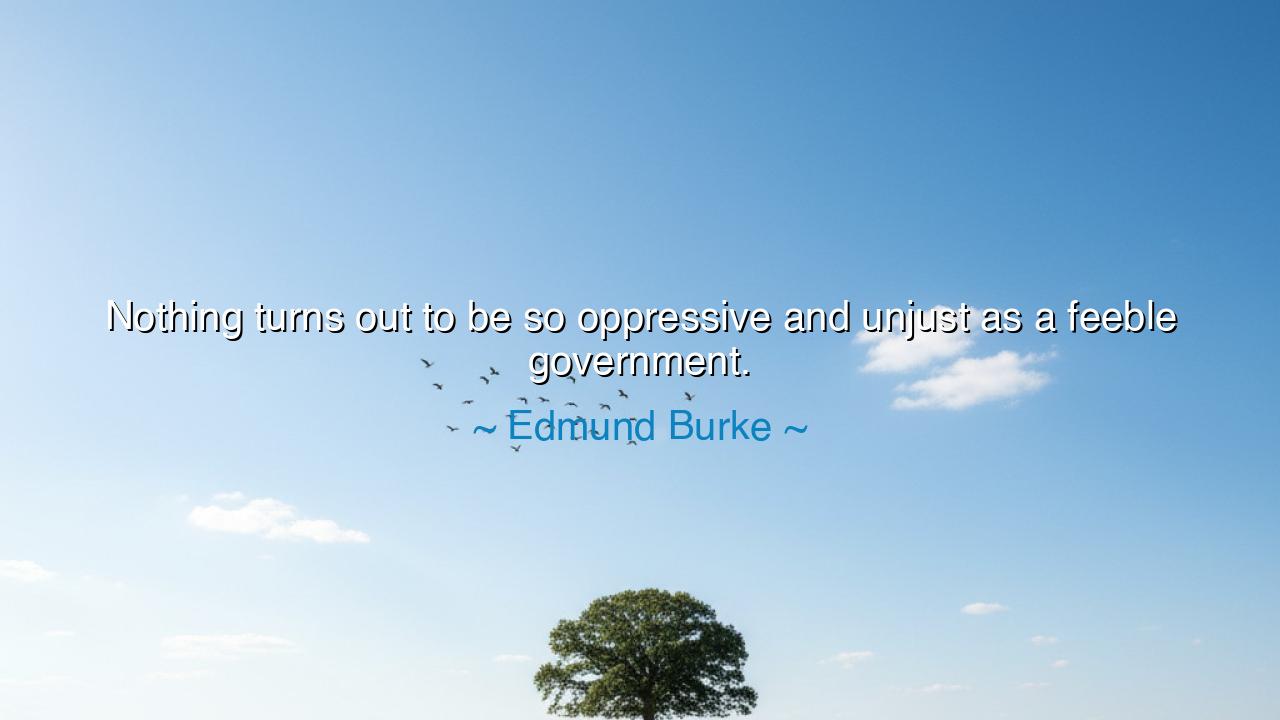
Nothing turns out to be so oppressive and unjust as a feeble






When nations tremble between order and chaos, and when justice hangs by a thread of hesitation, the voice of Edmund Burke, one of history’s wisest guardians of liberty, still rings like a warning bell across the centuries: “Nothing turns out to be so oppressive and unjust as a feeble government.” These words, spoken with the gravity of experience and the fire of conviction, reveal a paradox that few understand — that weakness in power is not mercy, but cruelty; indecision in rule is not kindness, but tyranny disguised in cowardice. Burke, the defender of balance and reason in an age of revolutions, saw that when authority loses its strength, corruption, anarchy, and despair fill the void. A nation without firmness in its governance does not drift gently into freedom; it collapses into oppression.
The origin of this quote lies in Burke’s reflections during the turbulent years of the late eighteenth century — a time when kings fell, parliaments quarreled, and mobs claimed the streets. He witnessed firsthand the French Revolution, where the weakness of Louis XVI’s government, paralyzed by indecision and fear, opened the gates to bloodshed. The monarchy had been unjust, yes — but its feebleness in the face of unrest proved far worse. When the throne faltered and authority hesitated, chaos rushed in like a flood. The guillotine became the symbol of liberty, and the cry for justice turned into a reign of terror. Burke, horrified yet prophetic, warned that power, if it does not govern with strength and wisdom, will soon be seized by those who rule with violence and vengeance.
To Burke, a feeble government was not merely one without might, but one without principle. He believed that true strength in governance comes not from oppression, but from conviction — from the courage to uphold law, virtue, and order even when the winds of passion rage against them. When rulers are afraid to enforce justice, when they yield to every shout of discontent or every whim of popularity, they become instruments of injustice themselves. For justice requires discipline, and liberty demands guardianship. The government that fears to govern will soon find itself governing through fear.
History has confirmed Burke’s warning time and again. In the fall of the Weimar Republic, the government of Germany after the First World War, weakness proved fatal. Unable to control extremism, unable to restore faith in its institutions, it crumbled beneath the weight of inflation, despair, and division. Into that void stepped tyranny — the cold and brutal order of Adolf Hitler, who promised strength where weakness had failed. The tragedy of Weimar was not born of too much government, but of too little — not of tyranny, but of timidity. A state that cannot defend the rule of law will soon serve the rule of the sword.
Burke’s insight was not a cry for despotism, but for moral strength. He understood that power, rightly used, is not the enemy of freedom — it is its protector. Just as the shepherd’s staff guards the flock from wolves, so must government wield its authority to protect the innocent from the wicked, and the weak from the strong. But when rulers shrink from this duty, when they mistake weakness for compassion and neglect for tolerance, injustice grows bold. Crime thrives, corruption festers, and the people, disillusioned, turn against the very idea of law. Thus, a feeble government becomes the cruelest oppressor of all, for it allows evil to reign unchecked under the mask of inaction.
Yet Burke’s words also speak beyond the realm of kings and parliaments — they speak to every soul who holds any measure of authority: the parent in the home, the teacher in the school, the leader in the community. For wherever responsibility exists, the same truth applies: weakness in leadership breeds chaos, and chaos breeds cruelty. To lead is to bear the burden of decision, to stand firm in principle even when the world cries out for compromise. The just ruler, like the wise man, must know that mercy without strength is futility, and power without virtue is corruption. Only when the two are united — strength guided by conscience — does true justice flourish.
The lesson for our time is clear: neither nations nor individuals can preserve freedom through feebleness. A people who demand justice must demand courage — courage from their leaders and from themselves. Governments must be firm but fair, decisive yet humane. Citizens must not shrink from holding them accountable, nor from upholding order in their own hearts. For liberty is not maintained by softness, but by discipline, resolve, and moral clarity. When authority is strong and just, it protects all; when it is weak, it betrays all.
And so, let the wisdom of Edmund Burke endure like a torch through the ages: “Nothing turns out to be so oppressive and unjust as a feeble government.” These words remind us that freedom does not perish in chains alone — it also perishes in confusion. When the guardians of justice falter, injustice takes their place. Therefore, let rulers rule with strength of virtue, and let the governed demand not comfort, but courage. For only through the firmness of justice can the peace of liberty endure — and only through the strength of principle can a nation remain both free and whole.






AAdministratorAdministrator
Welcome, honored guests. Please leave a comment, we will respond soon